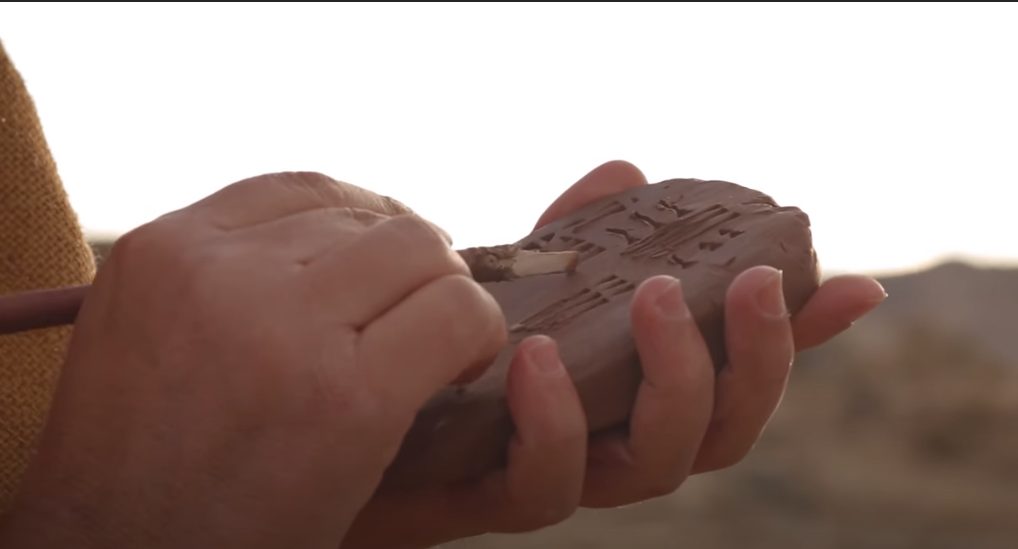
I have long concerned myself with the original sin of settling down; sedentism. The general idea is that nomadic hunting and gathering is the natural Eden state of the human animal, and that quitting a nomadic lifestyle and having a fixed address leads to property, and property leads inevitably to cities, mass warfare, kings, money, oppression, inequality–then on to more modern anti-human shit like nuclear weapons and climate change.
The classic progressive counter-argument to all of this is: yeah, but what about infant mortality rates, or non-infants dying from a toothache? What about science? I’m not here to argue that one today. I’ll just say I’m not convinced and leave it at that.
However, there is another small part of the counter-argument that I’m not allowed to just leave alone.
Because the messenger’s mouth was heavy and he couldn’t repeat [the message],
the Lord of Kulaba patted some clay and put words on it, like a tablet.
Until then, there had been no putting words on clay.—Enmerkar and the Lord of Aratta, a creative written work from the first civilization in Sumeria, about 3800 years ago
I’ve been studying the history of writing, and I’m forced to acknowledge that what we think of today as literature, or even too my beloved and preferred belles-lettres, did not exist before the Fall–that recording historical, mythological/fictionalized, and poetic creations made of words on papyrus or clay was not and could not be a thing until the technology existed to make them.
Clay is the paper. Reeds are the pencils. They require technology, and reedy pencil-makers, and the pencil-makers are further down the social hierarchy than the scribes, much less the kings.
“The Sumerians had two things around them in virtually limitless abundance–the clay beneath their feet, and the reeds that grew in the marshes, and along the banks of the Tigris and Euphrates rivers.” (But they still needed to be gathered, and manufactured.)
Moreover, the pencilmakers had no leisure, and might even be slaves. So in order to compose Enmerkar and the Lord of Aratta, or The Epic of Gilgamesh, you had to be privileged and ennobled above others.
Sumeria and Egypt settled down at more or less the same time, and starting making lit about the same time too, four-thousandish years back. The very first author-superstars we can name were Ptahhotep in Egypt–he was a vizier at court–and Enheduanna of Sumeria, a straight-up Princess as the daughter of Sargon of Akkad.
That beautiful thing so close to your heart, your artistic process, itself was dependent on the same system that creates inequality and so many other evils, and being high up in that system. Not coincidentally, your process would produce works that praised this system. You wrote hymns to the gods approved by the Despot. You wrote paeans to the Despot his own self, and you didn’t call his mighty and valorous acts of battle war crimes. You wrote moral instructions to the young, about how to fit into the system, and not revolutionary tracts that would undermine the very edifice that allowed you to live such a thoughtful and artistic life.
We might call this the Rachel Maddow effect. Yes, things are a little more complex today–up until now the despots have to stand for election once every four years, in this enlightened and alleged demos. But the essential premise holds. You’re not ever going to fundamentally challenge the system that is dumping thirty thousand shekels into your lap every single day of the year. You’re not going to waste your valuable breath on Medicare for Pencilmakers …
I’m a bit far afield. It’s hard to straddle four thousand years gracefully.
But I intend to keep trying.
Suddenly There Is Nothing
Ut-napishtim speaks:
Why have you exerted yourself? What have you achieved ?
You have made yourself weary for lack of sleep,
You only fill your flesh with grief,
You only bring the distant days of reckoning closer.
Mankind’s fame is cut down like reeds in a reed-bed.
A fine young man, a fine girl,
Beloved of Death.
Nobody sees Death,
Nobody sees the face of Death,
Nobody hears the voice of Death.
Savage Death
just cuts mankind down.
Sometimes we build a house, sometimes we make a nest,
But then brothers divide it upon inheritance.
Sometimes there is hostility in the land,
But then the river rises and brings flood-water.
Dragonflies drift on the river,
Their faces look upon the face of the Sun,
(But then)
suddenly there is nothing.
(The happy ending to the Epic of Gilgamesh,
https://www.humanistictexts.org/gilgamesh.htm
)